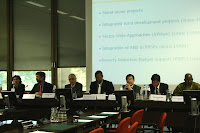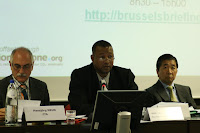

Photos courtesy of CTA
CTA - The Technical Centre for Agricultural and Rural Cooperation (ACP-EU) – held its 6th Brussels Briefing on 2nd July 2008 on the theme of “New Players, New Drivers in ACP Rural Development”. Hon Waven William, invited in his capacity as Seychelles Representative to the ACP-EU Joint Parliamentary Assembly (JPA) and Co-Rapporteur for the JPA’s report on “Effectiveness of Aid and Definition of Public Development Aid”, participated as the Discussant for the third panel of the day.
Some 120 participants, ranging from officials of the European Commission, representatives of Civil Society Organisations and Non-governmental Organisations from Europe and ACP States, to representatives of Permanent Missions of member countries of the European Union and the ACP Group, took an active part in the discussions of the three panels namely (i) “New actors in the global aid system: opportunities and challenges”; (ii) “New donors from the south, new approaches?” and (iii) “Towards coordination, shared responsibility and accountability”.
The 6th Brussels Briefing is part of a series of discussion meetings on key issues and challenges for rural development in the context of EU-ACP cooperation. The 6th Briefing looked at the agricultural and rural development sector in the context of ACP countries, the role of private foundations and the role of “emerging donors” (China, India, Brazil, Japan) in ACP countries. The CTA brought in an interesting array of panellists from the World Bank, the Alliance for a Green Revolution in Africa, Concord, the Centre for Chinese Studies at South Africa’s Stellenbosch University, the African Department of the IMF, the European Commission, and the Global Donor Platform for Rural Development, JICA and NEPAD.
The briefing reaffirmed the relevance of the 2005 Paris Declaration on Aid Effectiveness and, whilst decrying the decreasing levels of Official Development Assistance (ODA) to the agricultural sector, insisted on the need to bring back agriculture to the centre of the development agenda, particularly given the spiralling levels of basic food prices. The meeting also recognized that there was a need to develop new partnerships between multilateral institutions and philanthropic foundations whose aid contributions have been significantly increasing, whereas decreases are observed in aid from traditional donors (particularly bilateral agencies) which remain, nonetheless, the biggest contributors to ODA. Yet, some of the “emerging donors” are not really new. China, for instance, classified as a “modest donor”, has had a long term relationship with Africa acting much more like a “partner” than as a “donor”. Indeed, the 2007 Lisbon Africa-EU Summit did build on this approach when Heads of States and Governments adopted ideas and programmes based on the principle of a true partnership between equals. It was agreed that, still, better quality and quantity of aid, better coordination, transparency and greater accountability (including parliamentary) are required. It is hoped that the awareness raised and the rich information exchanged will feed into the Third High-level Forum (HLF-3) in Accra in early September 2008.


No comments:
Post a Comment